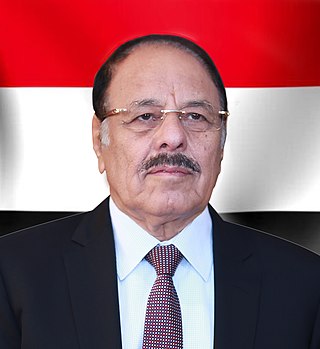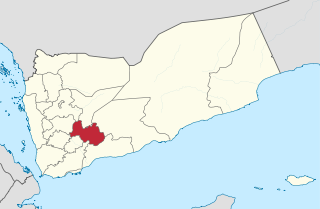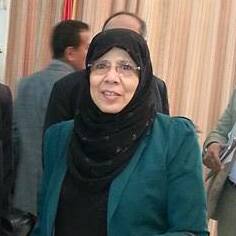Related Research Articles
In its war on terrorism in Yemen, the US government describes Yemen as "an important partner in the global war on terrorism". There have been attacks on civilian targets and tourists, and there was a cargo-plane bomb plot in 2010. Counter-terrorism operations have been conducted by the Yemeni police, the Yemeni military, and the United States Armed Forces.

Abdul Aziz Abdul Ghani was a Yemeni politician who served as Prime Minister of Yemen from 1994 to 1997, under President Ali Abdullah Saleh. Ghani was a member of the General People's Congress party.
Ahmed Ali Abdullah Saleh al-Ahmar is the eldest son of former Yemeni President Ali Abdullah Saleh, and was a commander of approximately 80,000 troops of the Republican Guard unit of the Yemeni Army.

The Al-Qaeda insurgency in Yemen is an ongoing armed conflict between the Yemeni government, the United States and their allies, and al-Qaeda-affiliated groups in Yemen. It is a part of the Global War on Terror.

Ali Mohsen Saleh al-Ahmar, sometimes spelled Muhsin, is a Yemeni military officer and politician who served as the vice president of Yemen from 2016 to 2022, when he was dismissed by President Abdrabbuh Mansur Hadi, who transferred the powers of the president and vice president to the Presidential Leadership Council. He is a lieutenant general in the Yemeni Army and was the commander of the northwestern military district and the 1st Armoured Division. He played a leading role in the creation of the General People's Congress.
The Battle of Zinjibar was a battle between forces loyal to Yemeni leader Ali Abdullah Saleh and Islamist militant forces, possibly including elements of al-Qaeda in the Arabian Peninsula (AQAP), for control of the town of Zinjibar and its surroundings as part of the wider insurgency in the self-declared Al-Qaeda Emirate in Yemen. Many of the Islamist forces operating in Abyan province refer to themselves as Ansar al-Sharia.

The Battle of Taiz erupted during the 2011 Yemeni Revolution, between forces loyal to Yemeni leader Ali Abdullah Saleh and opposition protesters, backed by armed tribesmen and defecting soldiers in the southwestern Yemeni city of Taiz.
Samir ibn Zafar Khan was a Saudi Arabian naturalized U.S. citizen, jihadist militant, and the editor and publisher of Inspire magazine, an English-language online magazine reported to be published by the Islamic terrorist group al-Qaeda in the Arabian Peninsula (AQAP). He was killed in a drone strike in Yemen together with Anwar al-Awlaki.

Abdul-Malik al-Houthi is a Yemeni politician and religious leader who has been the second and current leader of the Houthi movement, an organization principally made up of Zaydi Shia Muslims.
Jamal Ahmad al-Sharabi, was a Yemeni photojournalist with the independent weekly, Al-Masdar, in Sana'a, Yemen.

On 5 December 2013, a coordinated terrorist attack occurred targeting the Ministry of Defense complex in Sana'a, Yemen. Heavily armed militants utilized a car bomb to breach the gates of the complex before storming it and occupying a hospital within it. The attack, which killed 52 people and injured 167, was claimed by Ansar al-Sharia, an affiliate of al-Qaeda in the Arabian Peninsula (AQAP). AQAP later issued an apology for the attack after footage from within the hospital was broadcast showing the gunmen murdering medical personnel.
The Yemen Post was a newspaper in Yemen published from 2007 and now defunct. It was also Yemen's first hourly updated online news service with reporters spread throughout the country. The Yemen Post hard copy version was distributed mostly in Yemen and was first launched in a newspaper format on 2 November 2007. The newspaper is distributed to over 2000 government institutions, embassies, organizations, businesses throughout Yemen. Along with the foreign distribution to neighboring countries, the Yemen Post is also distributed to some communities within Europe and the United States. The format of the newspaper was changed to a full-colored, top of the art tabloid format on 16 February 2009. The paper was founded by the current publisher and editor in chief, Hakim Almasmari.

The 2014 Rada' bombings occurred on December 16, 2014, after two car bombs exploded in Radda District, Al Bayda Governorate, Yemen killing as many as 31 people, including 20 children.

The following lists events that happened in 2015 in Yemen.
"Yemeni crisis (2011–present)" refers to events of the Houthi insurgency in Yemen, the Yemeni revolution, the Al-Qaeda insurgency in Yemen and the South Yemen insurgency.

The 2015 Sana'a mosque bombings were four suicide attacks targeting two mosques on 20 March 2015 in Sana'a, Yemen.

Hooria Mashhour is a Yemeni human rights and women's rights activist. She held the position of Minister of Human Rights in post-revolution Yemen, starting in 2012. Due to safety concerns, she left the position in 2014, moving to Aden.
The Popular committees, also known as the People's Committees, are armed groups formed by Yemeni tribes on behalf of more professional armed forces.

On 22 April 2018, an airstrike by the Saudi Arabian-led coalition hit a wedding in the Bani Qa'is District of Hajjah Governorate, Yemen. Casualty estimates vary, with the Houthi-owned Al-Masirah reporting the toll later that day to be at least 33 civilians including the bride. Forty-five other people were injured.

Badreddin al-Houthi was a Yemeni politician and Zaidi Shia scholar. He was the father of the founder of the Houthi movement, Hussein al-Houthi, and the father of the organization's current leader, Abdul-Malik al-Houthi.
References
- ↑ About Us. Archived 2014-09-02 at the Wayback Machine Yemen Post. Retrieved 3 September 2014.
- ↑ Hakim Almasmari, Publisher and Editor in Chief of the Yemen Post. Arwa Al-Anesi, yemenpost.net, 3 November 2008. Retrieved 3 September 2014.
- ↑ Security Clearance. CNN. Retrieved 3 September 2014.